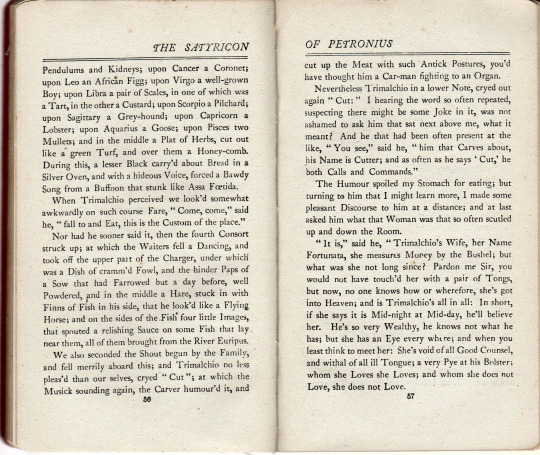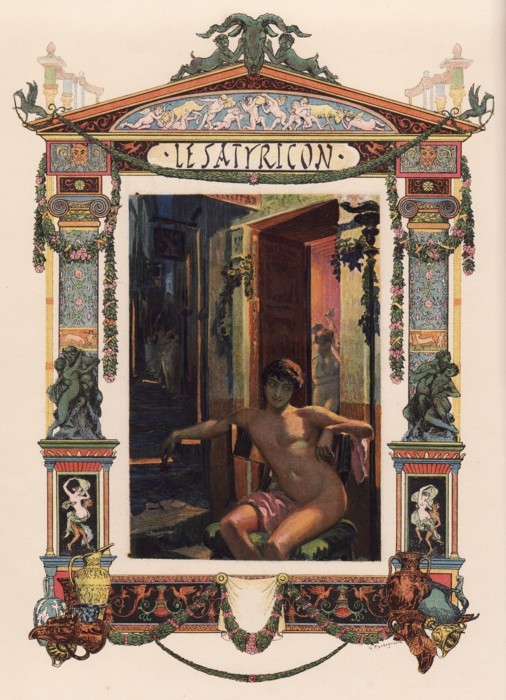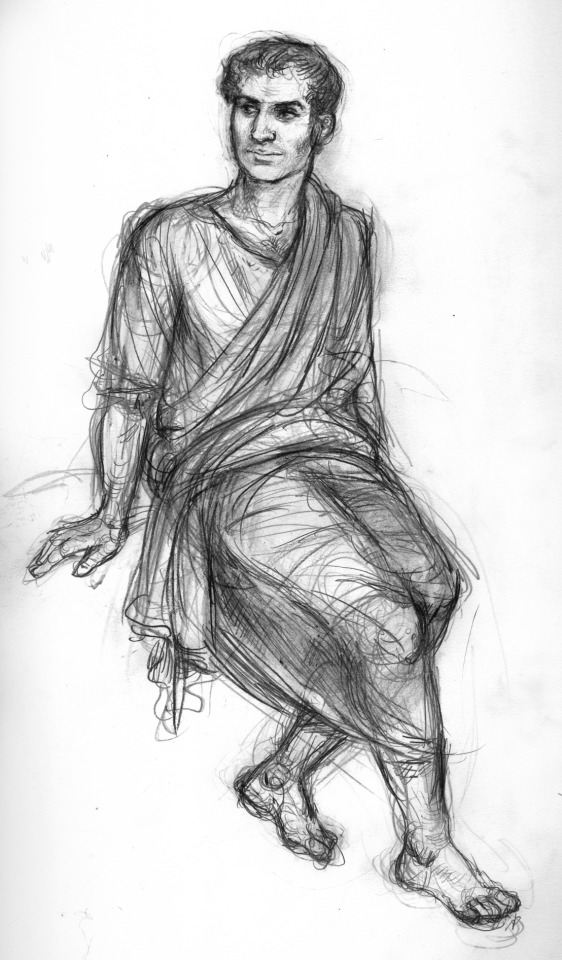#Petronius Arbiter
Text
Today's small mystery
Reshelving some books that got out of their normal shelf in the upstairs bedroom, with the usual side revelations: (a) I need ebook copies of all the [Insert Color Here] Fairy Books, as it'd be good to have a collection of searchable texts*; (b) I need ebook copies (implying searchable texts) of the entire C.S. Lewis collection, as hunting for one of the more obscure quotes online is a waste of time that could be spent doing useful things like baking, or on creating crap renders of the recalcitrant manes of local demigods: (c) Hmm, some of these have bookmarks stuck in them. I wonder what those are about...?
I went through two or three books that had marks in them (blank sticky notes, usually), and in all but one case was able to figure out why I'd marked them, and make a note elsewhere of their content and implications. (I've been flirting with getting into Obsidian to see if it helps me stay on top of this kind of issue, but am not sure I really need it yet.)
This one, though, has left me baffled. It might have simply been where I paused in my reading... but that's not usually how I use my bookmarks. Normally I place them as a reminder that there was something on that page or spread that needed my attention for some reason, or was related to something else that was going on in life, or writing, or something. In this case... now all I have to try to recall is exactly what the issue was.
The bookmark tells me that we're almost certainly talking about something I was reading in 1994, because it's a train ticket from the 5th of September in that year, which I bought on the train (because there's no "from" marking on it), while heading to Wicklow Town. ("Cill Mhantain" is Irish for Wicklow.)

...The book is the Abbey Classics edition of Petronius's Satyricon: the Burnaby translation of 1694. (Interestingly, the National Library of Ireland has the same edition I do. Though I bet theirs is in better condition.) This is what we'd think of as a paperback, though it's actually bound with a soft cloth binding and has a paper dust jacket. (A scan of the front cover and front flap is below.) There are a lot of places I could have picked this up used in Dublin, but my guess is that it comes from one of a number of trips to Hay-on-Wye.

...And here are the pages where the train ticket was stuck in: a passage from the middle of Trimalchio's feast.

So now all I have to do is work out why I marked those pages... thirty years ago. (eyeroll) Yay.**
Something to occupy myself while I go off and make a flammkuchen...
*They're all online at Gutenberg, so that's all right.
**Though looking at the obscure idiom/metaphor "She's a very Pye at his Bolster," I wonder if it was something to do with that. ETA: So the thing to do when you run into a phrase like this in translation is to check another translator and see what they've got. It hadn't occurred to me on first glance that "Pye" wasn't a culinary reference, but a contraction of "magpie". And surprise, the 1913 Heseltine translation at Tufts' Perseus Digital Library has this as "a magpie belonging to a sofa": i.e. a bird that "henpecks" you in your own bed. Ow.
118 notes
·
View notes
Text
emperor nero.mp4 and petronius the cuntiest bitch to have ever graced this earth
"[...] he described fully the prince's shameful excesses, with the names of his male and female companions and their novelties in debauchery, and sent the account under seal to Nero" (tacitus, annals xvi 19)
#i love p. and the satyricon but i mean what else could you expect from someone who's obsessed with the master and margarita#roman empire#my roman empire#petronius#petronius arbiter#emperor nero#ancient rome#my art#digital art#artists on tumblr#digital illustration#historical fanart
48 notes
·
View notes
Text
I have a bunch of favorite Roman/Byzantine couples, ranging from Factual to Probable to Crackship. Which do you like best? (There’s no other option. You Must Choose)
#my polls#tumblr polls#polls#cicero#clodia pulchra#clodia metelli#nero caesar#nero#gaius petronius#Petronius arbiter#poppaea#poppaea Sabina#Aurelian#queen zenobia#justinian#empress theodora#theodora#belisarius#antonina#ancient rome#byzantium
28 notes
·
View notes
Text
I just know back then in 60 ad proto fujoshis Esquilina and Procula were reading the satyricon by petronius while kicking their feet and giggling
14 notes
·
View notes
Text
Caius Petronius Arbiter – Satyricon, 3, LXXXVIII
Erectus his sermonibus consulere prudentiorem coepi <atque ab eo> aetates tabularum et quaedam argumenta mihi obscura simulque causam desidiae praesentis excutere, cum pulcherrimae artes perissent, inter quas pictura ne minimum sui vestigium reliquisset.
Tum ille: "Pecuniae, inquit, cupiditas haec tropica instituit. Priscis enim temporibus, cum adhuc nuda virtus placeret, vigebant artes ingenuae summumque certamen inter homines erat, ne quid profuturum saeculis diu lateret. Itaque herbarum omnium sucos Democritus expressit, et ne lapidum virgultorumque vis lateret, aetatem inter experimenta consumpsit Eudoxos quidem in cacumine excelsissimi montis consenuit ut astrorum caelique motus deprehenderet, et Chrysippus, ut ad inventionem sufficeret, ter elleboro animum detersit. Verum ut ad plastas convertar, Lysippum statuae unius lineamentis inhaerentem inopia extinxit, et Myron, qui paene animas hominum ferarumque aere comprehenderat, non invenit heredem. At nos vino scortisque demersi ne paratas quidem artes audemus cognoscere, sed accusatores antiquitatis vitia tantum docemus et discimus. Ubi est dialectica? ubi astronomia? ubi sapientiae cultissima via? Quis unquam venit in templum et votum fecit, si ad eloquentiam pervenisset? quis, si philosophiae fontem attigisset? Ac ne bonam quidem mentem aut bonam valitudinem petunt, sed statim antequam limen Capitolii tangant, alius donum promittit, si propinquum divitem extulerit, alius, si thesaurum effoderit, alius, si ad trecenties sestertium salvus pervenerit. Ipse senatus, recti bonique praeceptor, mille pondo auri Capitolio promittere solet, et ne quis dubitet pecuniam concupiscere, Iovem quoque peculio exorat. Noli ergo mirari, si pictura defecit, cum omnibus dis hominibusque formosior videatur massa auri, quam quicquid Apelles Phidiasque, Graeculi delirantes, fecerunt.
[HIS] Reanimado por esas palabras, me dirigí a mi mentor para preguntarle el siglo de aquellas pinturas y el tema de ciertos cuadros que yo no entendía; también le pregunté a qué atribuía la decadencia actual, la desaparición de las bellas artes y en particular de la pintura, de la que no subsistía el menor vestigio. Contestó así: «Es el ansia del dinero lo que ha producido el cambio. Antaño, en efecto, cuando se apreciaba el mérito al desnudo, florecían las artes liberales y había una reñidísima competencia entre los hombres por divulgar pronto los descubrimientos útiles a la humanidad. Por eso Demócrito logró extraer la esencia de cada planta y se pasó la vida haciendo experiencias para descubrir la virtud de los minerales y vegetales. Eudoxo envejeció en la cumbre de una altísima montaña para captar los movimientos de los astros en el cielo; y Crisipo, para excitar su inventiva, purificó su mente por tres veces con eléboro. Y, para volver a las artes plásticas, Lisipo se murió de inanición, absorto en el esbozo de una estatua insuperable; y Mirón, cuyos bronces traslucían en cierto modo hasta el alma de los personajes y de las fieras que esculpía, no encontró sucesor. Pero nosotros, sumergidos en vino y crápula, ni siquiera tenemos el valor de estudiar la producción artística del pasado, sino que, detractores de la Antigüedad, tan sólo enseñamos y estudiamos sus vicios. ¿Dónde está la dialéctica? ¿Dónde la astronomía? ¿Dónde el camino tan trillado de la sabiduría? ¿Quién entra nunca en un templo y hace voto por alcanzar la elocuencia? ¿Quién busca asimismo la fuente de la filosofía? Ya ni siquiera se pide la salud física o moral, sino que apenas se pisa el umbral del Capitolio, uno pone por condición de su ofrenda el entierro de un pariente rico; otro, el descubrimiento de un tesoro; otro, el logro, sano y salvo, de treinta millones de sestercios. El mismo senado, maestro de rectitud y bondad, suele prometer mil libras de oro al Capitolio: esto es, para que nadie tenga reparos en correr tras el dinero, intenta con su dinero conciliarse al propio Júpiter. No te extrañe pues ya que la pintura haya decaído, cuando los dioses, como los hombres, todo el mundo ve más arte en un lingote de oro que en cualquier obra maestra de esos pobres maniáticos griegos llamados Apeles o Fidias.
0 notes
Text
For, while he was but too ready to accept the position that was almost immediately offered to him on his coming of age, and found, indeed, a subtle pleasure in the thought that he might really become to the London of his own day what to imperial Neronian Rome the author of the 'Satyricon' once had been, yet in his inmost heart he desired to be something more than a mere arbiter elegantiarum, to be consulted on the wearing of a jewel, or the knotting of a necktie, or the conduct of a cane.
"The Picture of Dorian Gray" - Oscar Wilde
#book quote#the picture of dorian gray#oscar wilde#coming of age#subtle#pleasure#london#imperial rome#neronian#satyricon#petronius arbiter#arbiter elegantiarum#jewel#necktie#cane#fashion
1 note
·
View note
Text

obsessed with the slutty slutty clothes the man at the center is wearing.
why that bare back with jewels? so that other men can caress it? and those cuffs with no sleeves? so that they can pull you in?
#satyricon#nothing about petronius arbiter elegantiae can be ordinary and I'm all here for it drinking up every detail#this picture is especially funny if you consider that it represents the king of Numidia welcoming Scipio Africanus#the guy looks like: uh there's something in my salad. And the kind is like: nevermind the salad boy look at how pretty I am#king*
21 notes
·
View notes
Text
I've been seriously lacking responding to tags so I have queued a few self rbs to reply to the kind words you left for me recently😚for now a general point i want to make is that when I first posted them I never expected anybody to care about my Satyricon drawings so every single comment means everything to me🫶🏻you will soon regret empowering me to post more... Trust...
#soon i will have to change my header to PETRONIUS ARBITER FAN PAGE (NOT IMPERSONATING!)#i also really appreciate the alcibiades love as alwayss#he will be back soon when i think of new situations😏
9 notes
·
View notes
Quote
Honeybee, what do you know,
you that are all honey and antique gold?
What do you know, Hellenic bee?
“I know of Pindar.”
Lion with fetid mane,
pensive lion,
perhaps you know of Hercules?
“Yes. And of Job.”
Viper among the sandalwood
and the lotus, magic viper,
have you worshipped Cleopatra?
“Yes. And Petronius.”
Rose that the courtesan wore
on her blue silk gown,
have you loved Mary Magdalen?
“And Jesus, too.”
Rubén Darío, Selected Poems of Rubén Darío
#Nicaraguan#Rubén Darío#Pindar#The Nemean Lion#Hercules#Job#Cleopatra#Petronius#Gaius Petronius Arbiter#Magdalene#Jesus#Jesus of Nazareth
9 notes
·
View notes
Text
Satyricon_tailhade_rochegrosse_I.jpg (506×700)

#george antoine rochegrosse#satyricon#petronius#gaius petronius arbiter#silver age latin#ancient rome#my post
3 notes
·
View notes
Text
petronius really had the right idea being nero's arbiter elegentiae. wish i could get away with being someone's court faggot
#tagamemnon#petronius#he knew what he was about#now granted he did not really get away with it in the end. but still#queueusque tandem abutere catilina patientia nostra
329 notes
·
View notes
Text
gaius petronius arbiter x female reader dating headcanons ^_^

he leaves you for a man
53 notes
·
View notes
Text

A Ship Wrecked off a Rocky Coast
Simon de Vlieger (1601–1653)
National Maritime Museum
Si recte calculum ponas, ubique naufragium est.
(If you reckon correctly, shipwreck is everywhere.)
—Gaius Petronius Arbiter
44 notes
·
View notes
Text

My latest in my historical hot dudes series, for @emperornero- it's Gaius Petronius Arbiter, satirical novelist, fashion consultant and hero of extremely dubious historical fiction. He's ready for dinner-- he's dressed in a light cloak, his sandals have just been removed, and he's ready to tell a raunchy joke. He's based loosely on a younger Leo Genn, who played Petronius in the 1951 adaptation of Quo Vadis, where he is inexplicably besties with St. Peter.
Anyway, someday I'm going to write about this guy because he's much cooler and more interesting than you'd imagine reading or watching any iteration of Quo Vadis (read Petronius's novel the Satyricon, it's sexy and funny and extremely weird)!
#historical hot dudes#gaius petronius arbiter#gaius petronius#ancient rome#sketchbook#sketch#art#illustration
53 notes
·
View notes
Text
is petronius arbiter even dead? scholars remain divided
43 notes
·
View notes
Text
Caius Petronius Arbiter – Satyricon, 2, XXXIV
Eheu nos miseros, quam totus homuncio nil est!
Sic erimus cuncti, postquam nos auferet Orcus.
Ergo vivamus, dum licet esse bene.
[HIS] ¡Ay! ¡Pobres de nosotros! ¡Qué poquita cosa es el hombre! ¡He aquí en qué pararemos todos nosotros cuando el Orco se nos lleve! ¡A vivir, pues, mientras tengamos salud!
[…] Eheu, inquit, ergo diutius vivit vinum quam homuncio. Quare tangomenas faciamus. Vita vinum est. […]
[HIS] ¡Ay! El vino vive bastante más que la pobre criatura humana. Bebamos, pues. El vino es vida.
#Petronius Arbiter#Satyricon#saec. I#60#scriptum#philosophia#Caius Petronius Arbiter#Lisardo Rubio Fernández#Gredos
0 notes